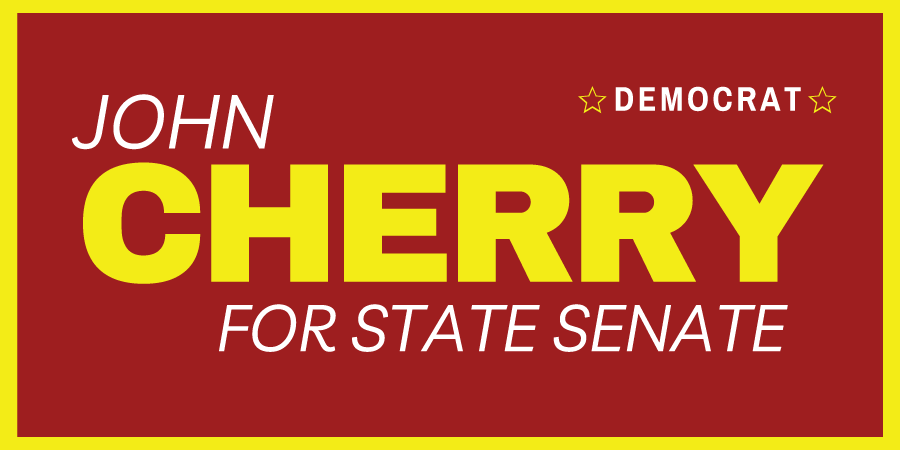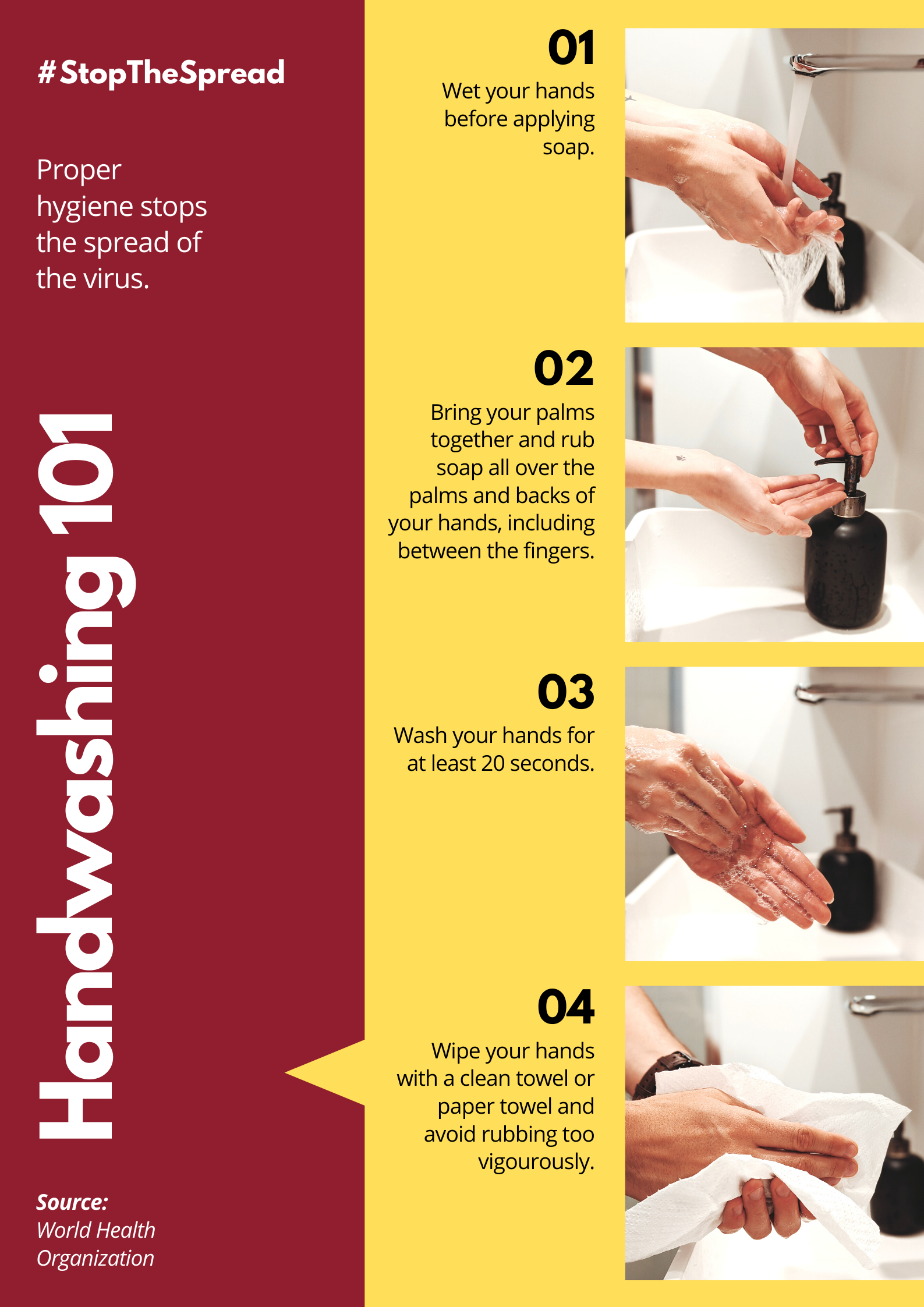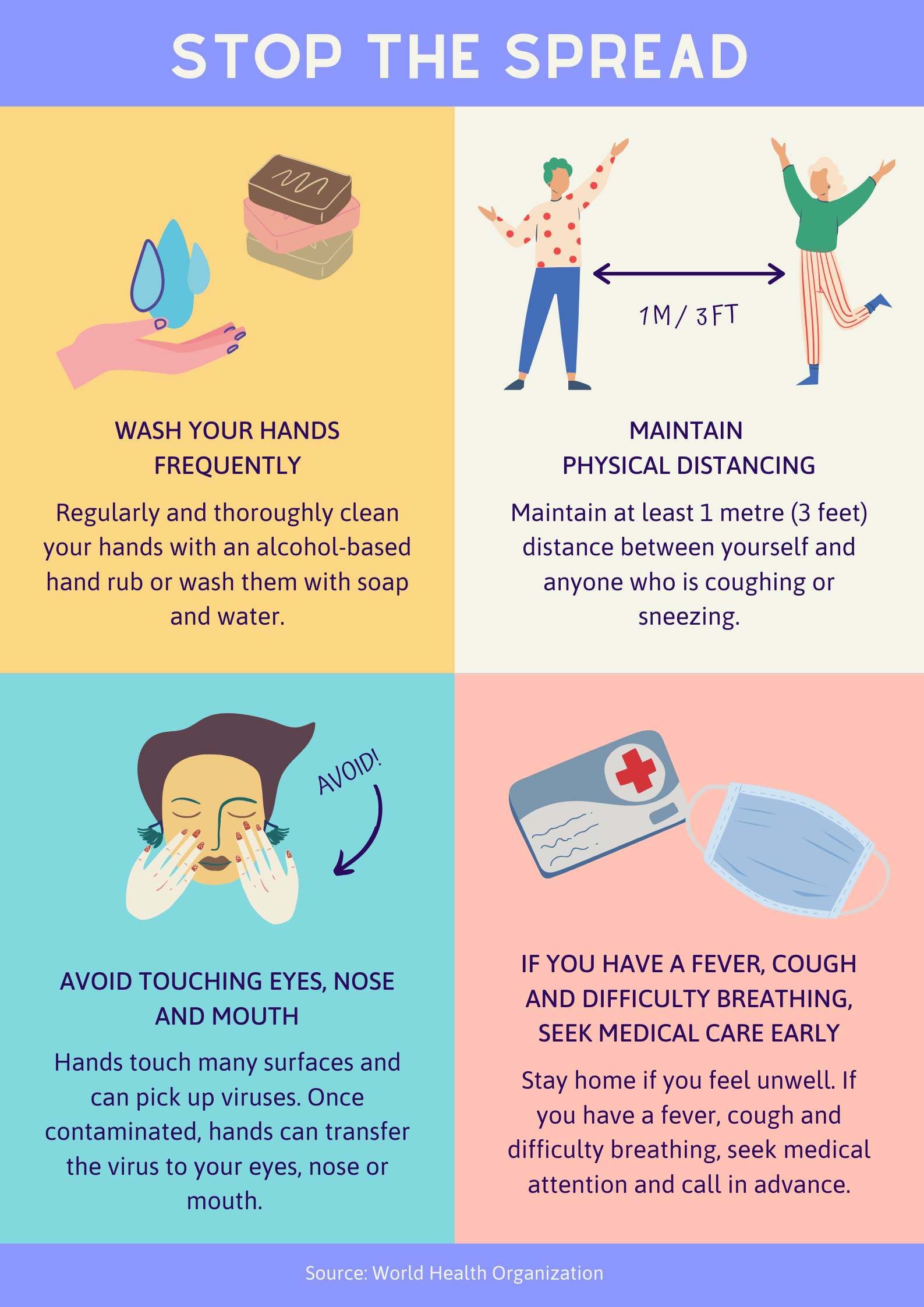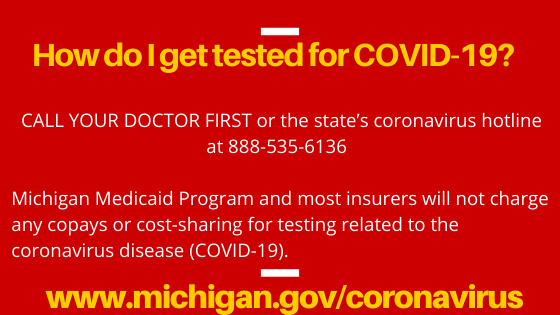COVID-19 Resources
Overview of Executive Order 2020-21
Governor Gretchen Whitmer signed the “Stay Home, Stay Safe” Executive Order (EO 2020-21), directing all Michigan businesses and operations to temporarily suspend in-person operations that are not necessary to sustain or protect life. The order also directs Michiganders to stay in their homes unless they’re a part of that critical infrastructure workforce, engaged in an outdoor activity, or performing tasks necessary to the health and safety of themselves or their family, like going to the hospital or grocery store.
Effective at 12:01 am on March 24, 2020, for at least the next three weeks, individuals may only leave their home or place of residence under very limited circumstances, and they must adhere to social distancing measures recommended by the Centers for Disease Control and Prevention when they do so, including remaining at least six feet from people from outside the individual’s household to the extent feasible under the circumstances.
Executive Order 2020-21 prohibits all businesses and operations from requiring workers to leave their homes, unless those workers are necessary to sustain or protect life or to conduct minimum basic operations. Businesses and operations are to designate the workers that meet those criteria, and must adopt social distancing practices and other mitigation measures to protect workers and patrons in the performance of that necessary in-person work.
Workers that are necessary to sustain or protect life include those in health care and public health, law enforcement and public safety, grocery store workers, and more. For a full list of these critical infrastructure workers, click the link to Executive Order 2020-21 at the bottom of this page.
Additionally, under Executive Order 2020-21, all public and private gatherings of any number of people occurring among persons outside a single household are temporarily prohibited. People may leave the house to perform for limited, necessary purposes, and may engage in outdoor activities like walking, hiking, running, cycling, or any other recreational activity, consistent with remaining at least six feet from people from outside a person’s household and with other restrictions imposed by prior executive orders. Individuals and employers should look first to the text of EO 2020-21, the FAQ document being updated by the Governor’s office, and the MDHHS website outlining critical infrastructure to determine if they fall under EO 2020-21
If it is not clear whether an individual or employer is critical infrastructure under the text of EO 2020-21, they should consult the CISA memorandum on Identification of Essential Critical Infrastructure Workers During COVID-19 Response here: https://www.cisa.gov/sites/default/files/publications/CISA_Guidance_on_the_Essential_Critical_Infrastructure_Workforce_508C_0.pdf
Helpful Information
Attorney General: Know Your Rights
MDHHS: Guidance for Business
Reporting a business that you believe is not following the Executive Order:
- If the complaint involves employers/businesses open in violation of the “Stay Home, Stay Safe” executive order, those complaints should be made to local law enforcement (e.g., police department, county sheriff).
- If the complaint involves the operation of an employer/business in violation of the public health (e.g., social distancing) components of EO 2020-21, those complaints should be made to local public health authorities.
- If an employee is worried about workplace conditions or working with a sick colleague, they can also contact MIOSHA: https://www.michigan.gov/leo/0,5863,7-336-78421_11407_15349-153893–,00.html
- Complaints regarding price gouging related to COVID-19 should be directed to the Attorney General’s Consumer Protection Hotline. Here is the contact information for the Michigan Attorney General’s consumer complaint hotline: (877) 765-8388 or online at www.michigan.gov/agcomplaints
Additional guidance for businesses related to food and agriculture?
Here is additional guidance from MDARD. They have also set up an email where constituents can ask questions related to COVID-19 and agriculture related business designations: MDARD-COVID19@michigan.gov.
Finding Information about School Closures
MDHHS has released a series of memoranda related to COVID-19 and school closures, including memos on the following topics:
- Special education
- Nutrition
- State funding
- Federal funding
- Student assessments
- Great Start Readiness Program (GSRP)
- Feeding children during closures
- Head Start
Testing
Q. How do I know if there is a confirmed COVID-19 case in my county?
A. Go to Michigan.gov/coronavirus. Scroll down to see the table of daily cases by county. Under that there is a link to go to cumulative data. That link will show you every county that has a confirmed case (note that this site is only updated once a day at 2pm).
Q. How can I get access to drive-thru testing in my community?
A. Individual providers are taking the lead on setting up drive-thru testing throughout the state. Try calling your local health department and local health systems to find out whether they already have plans in the works.
Q. How long should it take for test results to come back?
A. Currently most laboratory specimens received by MDHHS Bureau of Laboratories are processed within 48-72 hours. They have the capacity to process 125 samples each day. Private labs are looking at a turnaround time of 4-5 days at the moment.
Q. Where do I go if I do not have a primary care provider and want medical advice?
A. You can call the state of Michigan hotline for people who suspect they may have COVID-19, which is (888) 535.6136 and is open from 8am-5pm daily.
Q. How many test kits does the state have?
A. The number is constantly changing. Test kits for state laboratories are purchased/distributed through FDA.
Q. Is testing covered by insurance companies?
A. Yes, the Families First Coronavirus Response Act (HR 6201) requires health insurers and employer-sponsored health plans to cover COVID-19 testing and related services without cost-sharing and without prior authorization requirements.
Unemployment
Governor Gretchen Whitmer signed Executive Order 2020-10 to temporarily expand eligibility for unemployment benefits. This executive order is effective immediately and until Tuesday, April 14 at 11:59pm.
Under the governor’s order, unemployment benefits would be extended to:
- Workers who have an unanticipated family care responsibility, including those who have childcare responsibilities due to school closures, or those who are forced to care for loved ones who become ill.
- Workers who are sick, quarantined, or immunocompromised and who do not have access to paid family and medical leave or are laid off.
- First responders in the public health community who become ill or are quarantined due to exposure to COVID-19.
Access to benefits for unemployed workers will also be extended:
- The application eligibility period will be increased from 14 to 28 days
- The normal in-person registration and work search requirements will be suspended.
Eligible employees should apply for unemployment benefits online at Michigan.gov/UIA or 1-866-500-0017. A factsheet on how to apply for benefits can be found here.
Under the order, an employer or employing unit must not be charged for unemployment benefits if their employees become unemployed because of an executive order requiring them to close or limit operations.
The order also expands the State’s Work Share program. Employers are encouraged to implement the program that permits employers to maintain operational productivity during declines in regular business activity instead of laying off workers. More information about Work Share can be found here.
Additional unemployment resources for employees can be found here and for workers here.
In addition: here is a helpful factsheet on claiming unemployment during COVID-19 crisis:
https://www.michigan.gov/documents/uia/160_-_Claiming_UI_Benefit_In_Michigan_-_Jan2014_444213_7.pdf
Pandemic Unemployment Assistance and Compensation (Federal CARES Act)
The governor, under the federal CARES Act, signed an agreement between Michigan and the U.S. Dept. of Labor to implement Pandemic Unemployment Assistance and Compensation programs that grant benefits to workers who do not already qualify for state unemployment benefits.
- Workers include self-employed, 1099-independent contractors, gig, and low-wage workers who can no longer work because of the pandemic.
- The agreement also increases weekly benefits for all unemployed workers by $600 a week for up to four months and extends benefit payments from 26 to 39 weeks.
Benefits Extended to Self-Employed, Low-Wage, and Other Workers Affected by COVID-19
Under the CARES Act, individuals who are not already eligible for Michigan’s unemployment programs will now be provided a set amount of $600 a week for up to four months on top of the state benefit. Benefits are available for up to 39 weeks. These newly eligible individuals include self-employed workers, independent contractors, low-wage workers and those with a limited work history.
Benefits Increased for All Unemployed Workers
Under the CARES Act, weekly benefits for all unemployed workers will be increased by a set amount of $600 a week for up to four months. This applies to workers already in the unemployment system and eligible employees about to apply. These workers do not need to reapply and those about to apply do not need to take additional steps and should file as usual. If a worker’s application has previously been denied by the UIA in the past three weeks there is no need for them to reapply at this time. They will be notified by the agency with any additional action that may need to be taken.
The day or time of day in which a claim is filed will not impact whether a worker receives benefits or their benefit amount. Additionally, claims will be back-dated to reflect the date in which a claimant was laid-off or let go from their job due to COVID-19.
New Filing Schedule:
Online Filing Schedule – Michigan.gov/UIA.
Workers are encouraged to go online during off-peak times between 8PM-8AM
- Last names beginning with letters A-L are asked to file claims on Mondays, Wednesdays, Fridays.
- Last names beginning with letters M-Z are asked to file claims on Sundays, Tuesdays, or Thursdays.
- Saturdays will be available for anyone to accommodate those who could not file during their allotted window.
Call Center Filing Schedule – 866-500-0017:
- Last names beginning with letters A-L are asked to call on Mondays and Wednesdays between 8:00am – 5:00pm.
- Last names beginning with letters M-Z are asked to call on Tuesdays and Thursdays between 8:00am – 5:00pm.
- Fridays (8:00am – 5:00pm) will be available for anyone to accommodate those who could not file during their allotted window.
Online and Phone Access and Troubleshooting
- As of March 23, the MiLogin and MiWAM online unemployment system is experiencing slowness. The UIA IT team is constantly making adjustments to restore the system to full capacity. We apologize for any inconvenience and appreciate your patience while we work to resolve these issues.
- Applying online in off-peak hours (8:00pm- 8:00am) will expedite the claims process. The 24-hour website operates faster when there are fewer people on the site at any given time. The UIA also urges Michiganders using the website to expect longer load times. It may take several minutes for a page to load at this time. Users are asked to be patient and not click more than once to reload a page. Filing online remains the fastest way for Michiganders to apply for unemployment benefits.michigan.gov/uia
- Similarly, the phone system is experiencing high call volumes. Most individuals will receive the option to “stay in line” by using the call back feature as prompted. A subset of callers will unfortunately receive a busy signal.
- If a constituent already has an active claim and online account through MiWAM, they are able to log in and click “Chat with an Agent.” The queue for the live chat is significantly lower than the call wait times.
Looking for additional paid sick time or paid family leave time during this pandemic?
The Families First Coronavirus Response Act (FFCRA or Act) requires certain employers to provide employees with paid sick leave or expanded family and medical leave for specified reasons related to COVID-19. The Department of Labor’s (Department) Wage and Hour Division (WHD) administers and enforces the new law’s paid leave requirements. These provisions will apply from the effective date through December 31, 2020. Generally, the Act provides that employees of covered employers are eligible for:
- Two weeks (up to 80 hours) of paid sick leave at the employee’s regular rate of pay where the employee is unable to work because the employee is quarantined (pursuant to Federal, State, or local government order or advice of a healthcare provider), and/or experiencing COVID-19 symptoms and seeking a medical diagnosis; or
- Two weeks (up to 80 hours) of paid sick leave at two-thirds the employee’s regular rate of pay because the employee is unable to work because of a bona fide need to care for an individual subject to quarantine (pursuant to Federal, State, or local government order or advice of a healthcare provider), or to care for a child (under 18 years of age) whose school or child care provider is closed or unavailable for reasons related to COVID-19, and/or the employee is experiencing a substantially similar condition as specified by the Secretary of Health and Human Services, in consultation with the Secretaries of the Treasury and Labor; and
- Up to an additional 10 weeks of paid expanded family and medical leave at two-thirds the employee’s regular rate of pay where an employee, who has been employed for at least 30 calendar days, is unable to work due to a bona fide need for leave to care for a child whose school or child care provider is closed or unavailable for reasons related to COVID-19.
For more information, see this fact sheet for employees and this extensive list of FFCRA FAQs.
Have there been changes to tax deadlines?
The IRS federal tax filing deadline has been moved from April 15 to July 15. This deadline applies to both filing and payment. Previously, the administration had deferred payment but not the filing deadline. Now, both deadlines are moved regardless of the amount owed (it had previously applied only to those owing less than $1M). Those who expect a refund are encouraged to file earlier so as to receive their checks on time.
Per EO 2020-26. State of Michigan and city of Detroit income tax returns and payments due on April 15 are now due before midnight on July 15. Other state of Michigan cities with income taxes due on April 15 will now be due on July 15, while cities with income taxes due on April 30 will now be due on July 31.
Are there COVID-19 materials available in languages other than English?
Yes, the MDHHS Coronavirus website has infosheets targeted to groups of people (residents, education professionals, healthcare providers, etc.). Here is a link to the section for residents which includes a translated infosheet in several different languages.
Worried about eviction?
Governor Gretchen Whitmer signed Executive Order 2020-14, extending the deadline for Michigan residents to pay back taxes and avoid foreclosure on their property during the ongoing coronavirus (COVID-19) pandemic. Executive Order 2020-14, which takes effect immediately, will move the tax foreclosure deadline from March 31, 2020, to May 29, 2020, or 30 days after the state of emergency declared in Executive Order 2020-4 is terminated, whichever comes first.
Governor Gretchen Whitmer signed Executive Order 2020-19, which allows tenants and mobile home owners to remain in their homes during the COVID-19 pandemic even if they are unable to stay current on their rent. The order also relieves courts from certain statutory restrictions to enable them to stay eviction-related proceedings until after the COVID-19 emergency has passed. The executive order takes effect immediately and will remain in effect until April 17 at 11:59 p.m.
Are there any provisions for the “Stay at Home” order for the homeless? Are they being relocated anywhere?
No, but the CDC has issued interim guidance for both the unsheltered and the sheltered homeless during this crisis: https://www.cdc.gov/coronavirus/2019-ncov/community/homeless-shelters/unsheltered-homelessness.html
Family Assistance
Laid off from work? Fewer hours on the job?
It can be confusing to apply for unemployment benefits. Get the help and income you need. Apply online at Michigan.gov/UIA or call 1-866-500-0017. I know that currently, our unemployment system is struggling to keep up with the demand. If you are having struggles filing, consider filing at an “odd” time. This could be very early in the morning, or late at night, when the system’s are not as overloaded.
Having trouble affording or finding food?
You can get help with extra money for food by signing up for SNAP benefits. To apply, go to https://newmibridges.michigan.gov.
Our food banks and food pantries are working overtime to get you the food you need. Go to www.foodgatherers.org for a map and hours of all locations open right now.
If you know of a student in need of a meal while schools are out, you can michigan.gov.meetupeatup for all of the school locations providing meals. These meals are available to all children ages 0-18 at no cost.
Having trouble paying your electric or gas bills?
Call now for payment plan options if you are struggling. Consumers and DTE Energy have stopped shutoffs for senior citizens and other eligible households until April 5th.
Consumers Energy: 800-477-5050
DTE Energy: 800-477-4747
Need to know how to disinfect your house?
https://www.cdc.gov/coronavirus/2019-ncov/prepare/cleaning-disinfection.html
Worried you can’t make a rent or mortgage payment?
Governor Whitmer has stopped evictions for non-payment of rent through April 17. It is important to communicate with your landlord or bank during this time. If you are having trouble making payments:
Ask your landlord for alternate payment options immediately. If you have a housing subsidy, notify the agency that assists you to make a change. Contact your bank or mortgage company to delay and adjust payments.
Concerned about paying your taxes?
The Federal government has pushed the filing deadline to July 15. All taxpayers and business owners will now have additional time to make payments without interest or penalties.
If your property is in tax foreclosure, the Governor has extended the deadline to reclaim your property until May 29, 2020 or until 30 days after the lifting of the State of Emergency.
Unsure how to pay to be tested for COVID-19?
The Michigan Medicaid Program and most insurers will not charge any copays or cost-sharing for testing related to the coronavirus disease (COVID-19).
To get tested, CALL YOUR DOCTOR FIRST or the state’s coronavirus hotline at 888-535-6136. Do not go directly to the doctor’s office or emergency room. There is special protocol to follow to ensure that a possible infection spreads to as few people as possible.
What can I share with victims of domestic violence?
Yes, the National Network to End Domestic Violence has many resources for communities that may be at greater risk during this time of social distancing.
Michigan’s 24/7 hotline – 855-VOICES4 and text line 866-238-1454. More info here.
Do you or a loved one need mental health support?
Crisis Connections: 1-866-427-4747— This 24/7 number provides immediate support and resources for people in emotional crisis and can do it in 155 languages.
Disaster Distress Helpline: 1-800-985-5990 — This 24/7 service provides crisis counseling for people going through both natural and human-caused disasters. It’s free, multi-lingual and confidential. You can also text TalkWithUs to 66746.
Small Business Assistance
Is a loan what you need right now?
The U.S. Small Business Administration (SBA) has designated COVID-19 as a qualifying event. This means you can apply for an Economic Disaster Loans (EIDL) for businesses and private non-profits in Michigan. For more information, eligibility, and how to apply, visit https://sbdcmichigan.org/disaster-loan-help/.
Need extra time to make your March tax payment?
Small businesses scheduled to make their monthly sales, use and withholding tax payments on March 20 can postpone filing and payment requirements until April 20. The Treasury Department will waive all penalties and interest for 30 days. The waiver is not available for accelerated sales, use or withholding tax filers. Businesses with questions should call the Treasury Business Tax Call Center at 517-636-6925.
Managing cash flow and employees
The Department of Labor and Economic Opportunity is providing employer updates and guidance on these questions below. Click here for details: https://www.sbam.org/Portals/0/DOL%20COVID19%20Updates.pdf
- I have a cash flow problem and need liquidity.
- I need to cut back hours for my employees.
- I need to lay off workers on a temporary basis.
Need more help NOW? Maybe a Daily Briefing too?
The Small Business Development Center has developed a resource guide with steps your small business can take with COVID-19 in Michigan, which can be found here. The Small Business Association of Michigan (SBAM) has compiled COVD-19 resources for business owners, including daily briefings at 3pm. Visit here for more information.





